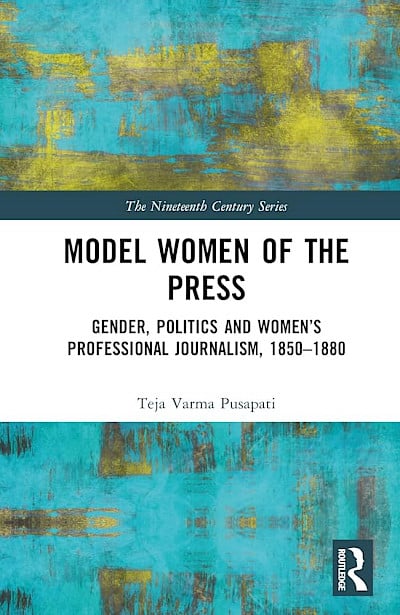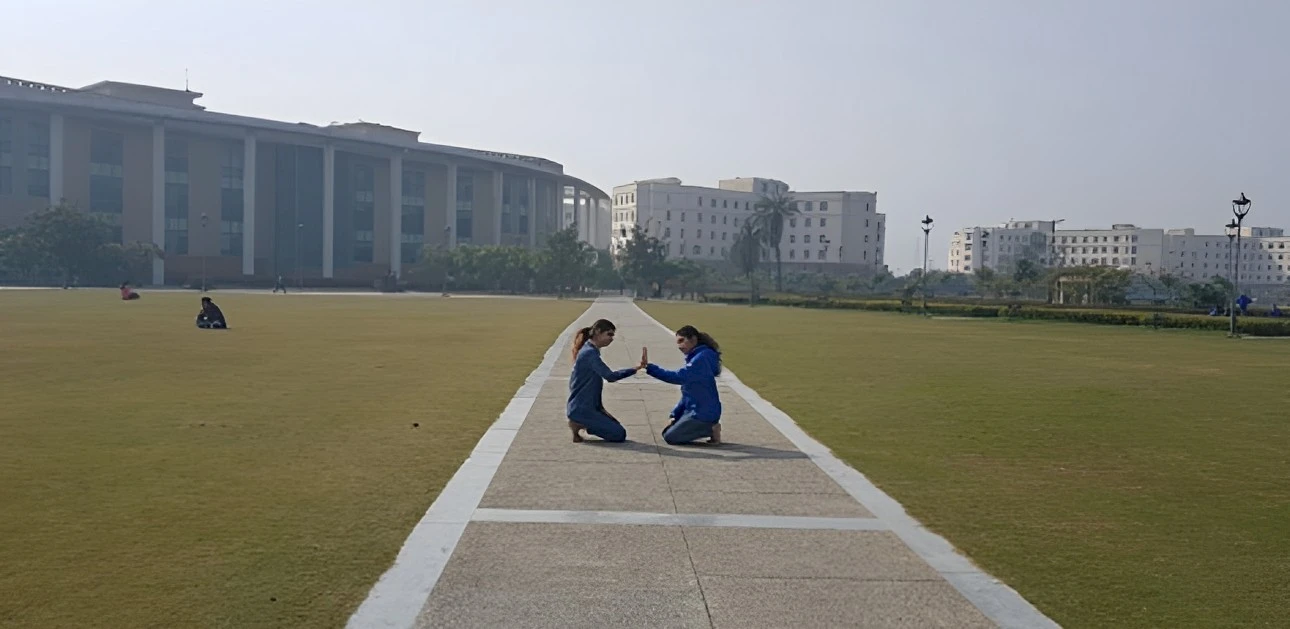Reading the fine print on women journalists in Victorian era

Editorial / October 21, 2024
Uncovering lost or ignored stories from women’s history is a passion for Dr. Teja Varma Pusapati, Associate Professor, Department of English. Her book, Model Women of the Press: Gender, Politics and Women’s Professional Journalism, 1850–1880 (New York: Routledge, 2024), offers the first extended account of the rise of ‘model women of the press’: Victorian women who not only stormed the male bastions of social and political journalism but also presented themselves as upholders of the highest standards of professional journalistic practice.
By placing women’s serious, high-minded journalism firmly within the context of ‘the widening sphere’ of female professions in mid-nineteenth-century England, the book shows how women writers, including feminists and reformers, contributed to the professionalisation of women’s authorship.
The book illuminates how women broke the codes of anonymity in several ways, including signing articles in their names and developing distinctly female personae. They proved, by example, women’s fitness for conventionally masculine lines of journalism.
Besides examining the rise of the Victorian woman writer as a serious social and political journalist, this book adds to the critical understanding of female political expression, authorial agency, and cultural authority in nineteenth-century England.
Drawing on extensive archival research and close analysis of a wide range of printed texts, from Victorian newspapers and periodicals to autobiographies, memoirs, and fiction, Dr. Pusapati elucidates several aspects of Victorian women’s journalism that have been previously ignored.
Some of the crucial issues the book deals with include the market interest of the feminist English Woman’s Journal and the ability of women like Eliza Meteyard and Frances Power Cobbe to write consistently on serious social and political issues in mainstream periodicals.
The book also brings to light the astonishing story of Harriet Ward, an army wife who reported from the war fields of South Africa at a time when British domestic ideology was at its zenith. Harriet Martineau, famous for her writings on political economy, features her lesser-known avatar as a reporter on Famine-devastated Ireland for a British daily and a transatlantic commentator for a New York-based anti-slavery weekly.
The final chapter focuses on the figure of the female professional journalist in Victorian novels, showing how these texts move away from the dominant myth of the author as a solitary genius to present the female journalist as a collaborator who adapts her writing to fit various newspapers and periodicals and works closely with male editors and peers.

Critical challenges and learnings
Building on her doctoral work at the University of Oxford, Dr. Pusapati negotiated the challenges of conducting ‘research at a distance’ when the world shut down due to COVID-19. “These challenges, familiar to most scholars who work on British/Western literature from India (archival material being difficult to access and often unaffordable, a sense of isolation from the larger community of scholars in the specific field, etc.), were exacerbated by the pandemic. There was no option but to rethink old research habits as best I could”.
“Working on the book made me sharply aware of the thoroughly collaborative nature of research”, she says. She notes that librarians and archivists went out of their way and well beyond the call of duty to keep her work going. For example, she said, “The archivist at the Brenthurst Library in South Africa sent me copies of the letters mailed by Harriet Ward, a pioneering female war correspondent reporting from the Eastern Cape to her editor in London. These letters contained vital information on channels of imperial reportage and military networks that helped me address questions I had grappled with for nearly two years!”. The university also helped by supporting an institutional subscription to databases of nineteenth-century periodicals that made hundreds of Victorian magazines fully accessible to her.
Commenting on the immense possibilities that online resources provide, she says, “Databases of research materials, virtual conferences, and reading groups have radically expanded the ambit of literary scholarship in the non-West. That said, access to these resources requires institutional funding and peer support. Moreover, there is no substitute for in-person conferences and the vital forms of intellectual exchange they can enable. We cannot afford to give up on either form of participation and should think of better ways of engaging in both”.
Dr. Pusapati, a recipient of the Curran Fellowship from the Research Society for Victorian Periodicals, has guided undergraduate and postgraduate research on various aspects of nineteenth-century British literature and culture, from domestic accidents and fashion to prostitution reform and palaeontology. She is supervising an exciting doctoral project on the representation of death and mourning in Victorian literature.
“Through my teaching and supervision, I hope to pass on something I have long known, thanks to my teachers in Delhi University– that the literary cultures of England, or America, or indeed any place in the world, are as much theirs to study as anyone else’s. I hope to foster a regard for rigorous research as well as a sense of its distinct joys–the fleeting moments of inspired thought that come only after many teeth-gnashing moments of frustration, the excitement of acquiring new training and knowledge, and of discovering new thoughts in writing,” she says.
Research on the book was supported by a TORCH Women in the Humanities writing fellowship at the University of Oxford and an Andrew W. Mellon fellowship at the Huntington Library in California. Dr Pusapati, whose work has appeared in the journals Victorian Periodicals Review, Women’s Writing, and Nineteenth-Century Gender Studies and in such edited collections as Women, Periodicals and Print Culture in Britain 1830s-1900 and the Routledge Companion to Literature and Feminism, hopes that her new project, too nascent to be named, will bring with it new habits of thought, new collaborations, and lots of intriguing questions.
More Blogs

The Hawthornden Literary Retreat bestowed on Dr Sambudha Sen to complete the manuscript of a novel
Professor Sambudha Sen, Head of the Department of English at Shiv Nadar Institution of Eminence, Delhi-NCR, was awarded a residency at the...

The Power of the Moving Body
Movement is an innate bodily action that humans have been exhibiting for the longest time. Long before language was invented, the body was the...

How Does A Multi-Disciplinary Approach To Education Enhance Learning And Prepare Students For A Multi-Faceted World?
In today’s world, where businesses are changing almost every day, it is the responsibility of educational institutes to provide holistic...